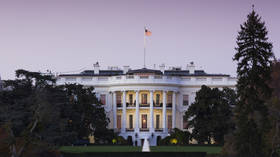Twitter jams open a back door to track your phone – which may already be in use by the government
Twitter is no longer allowing users to hide private data like their phone’s unique tracking identifier from advertisers, at the same time the US government is apparently targeting advertiser data to track Covid-19. Coincidence?
The social media giant announced the changes in a popup when users logged in on Wednesday, glibly informing those outside Europe that they would no longer be able to disable sharing “mobile app advertising measurements” and that there was nothing they could do about it.
Also on rt.com EU ‘to take common approach’ on Covid-19 tracking apps as projects in Germany and France face privacy concerns, legal challengesThe latest invasion of user privacy is just the most recent incursion on user rights coming out of the social media monopolies. Last month, users were informed that content not violating the rules might be removed anyway, because coronavirus had somehow forced the platforms’ human content moderators (some of whom already worked from home) to take time off for safety reasons.
But while Twitter claims that the new always-on “share data” setting is merely intended to reassure advertisers that people are watching their ads, it coincides with a dramatic uptick in government interest in advertisers’ location data, supposedly to track the spread of the coronavirus pandemic that has torpedoed the world economy and effectively imprisoned a good chunk of humanity in their homes.
The US government was reportedly already slurping up location data on millions of Americans through mobile advertisers – the same companies that are benefiting from Twitter’s new “always-on” mobile data sharing policy – even while it was meeting with Twitter and other social media platforms to gain access to their own treasure troves of user information, according to the Wall Street Journal, which cited several individuals involved in the surveillance project.
Given the public outrage in the past when social media users discovered the government spying on them through their beloved platforms, it’s no surprise Twitter would rather just leave the back door open through its advertisers and let the government take what it wants without getting directly involved. Certainly, Facebook is taking a bigger gamble by bragging about pressing users’ private data into service in the fight against the virus. The company of course claims to be protecting user privacy, but they’ve made that claim many times – usually right before a big privacy scandal.
Also on rt.com Zoom privacy debacle shows the danger of our reliance on Big Tech during coronavirus lockdownEven those who believe enhanced government surveillance during a pandemic is justified need only look to history to observe how ’wartime powers’ are seldom relinquished during peacetime. While it would be naive to claim Twitter isn’t already funneling users’ private data to governments as well as its corporate clients – that has been public knowledge since former NSA contractor Edward Snowden released documents on the PRISM project in 2013 – the growing romance between Big Brother and Big Tech should be cause for concern for anyone interested in ensuring privacy doesn’t become the biggest casualty of the coronavirus epidemic.
Like this story? Share it with a friend!
The statements, views and opinions expressed in this column are solely those of the author and do not necessarily represent those of RT.














